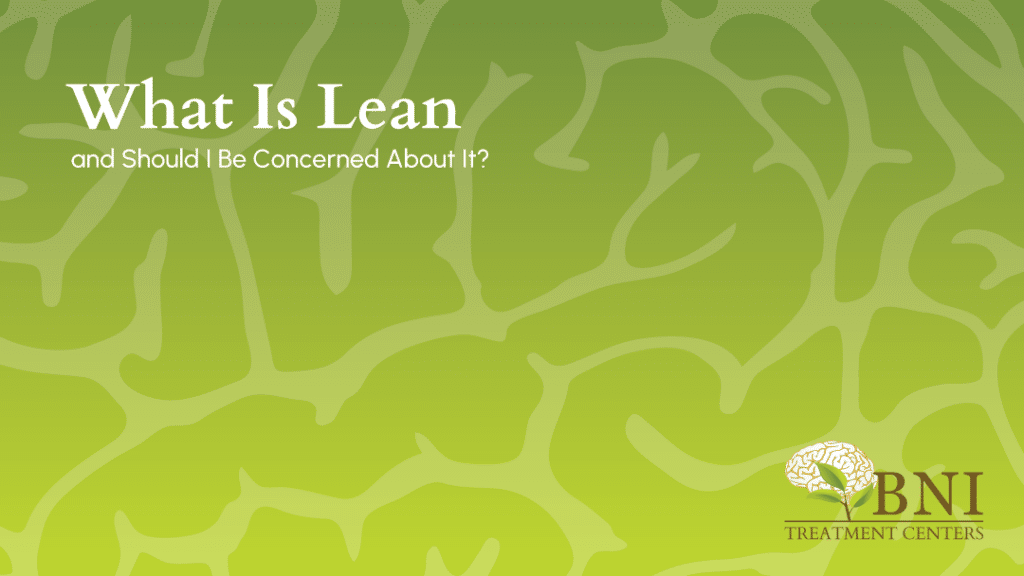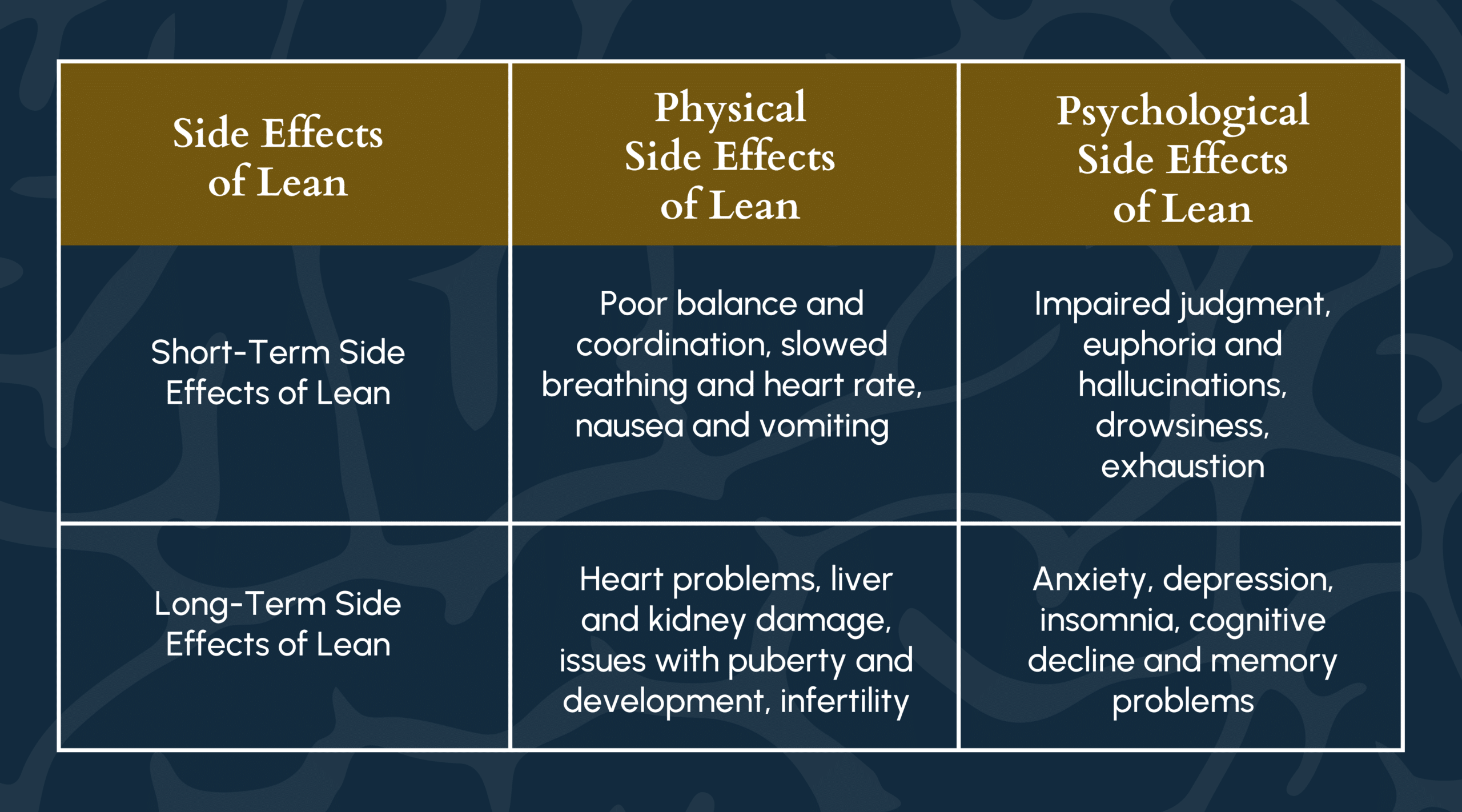
Purple drank. Sizzurp. Texas Tea.
These may seem like a random collection of words or phrases, but in reality, they all refer to a single substance – a drug known as “lean”. Lean is particularly popular among teens, with recent research finding that 66% of those who consume lean are under the age of 21.
At BNI Treatment Centers, we specialize in teen and adolescent treatment. We’re owned and operated by doctors, many of whom have treated lean addiction firsthand. Today, we’re going to dive into this complex but dangerous drug.
What is it, really? What are its effects? And does your teen need help?
What Is Lean?
Lean is a common party drug, made popular by its portrayal in various music subcultures. It is created from the combination of cough syrup, soda, and sugary candy. This mixture creates a colorful liquid, giving lean the nickname “purple drank”. The active ingredients in cough syrup are what combine to give lean its recreational effects: codeine and promethazine.
In the brain, codeine is converted into morphine and binds to your teen’s opioid receptors. This limits activity in the areas of the brain responsible for pain, releasing endorphins in the process. This process results in the sense of euphoria associated with opioids.
The other active ingredient, promethazine, is an antihistamine. These can cause a sense of drowsiness, but also decrease feelings of nausea or sickness. This is a particularly concerning effect, as lean is often consumed along with alcohol. Nausea acts as a defense mechanism against overconsumption, and without it, your adolescent may end up drinking far more than is safe.
Other Names for Lean
There are a variety of nicknames for every party drug, and lean is no exception. Your teen may refer to it as “sizzurp”, “Texas tea”, or “purple drank”. The Drug Enforcement Administration warns parents that lean and cough syrup often have their own emoji-based slang – 💜,🍇, and 🍼 can all refer to lean, especially when used together.

Can My Teen Get Addicted to Lean?
While any use disorder is a complex process involving both physical and psychological factors, the short answer is yes. Any substance or behavior that causes pleasure can lead to addiction. With lean, there are several mechanisms at work.
When lean is consumed, the brain will begin to adjust to the effects of the codeine. The systems in the brain will require more of this substance to react, and will respond less strongly when they do. This is known as building a tolerance, and your teen can quickly find themselves taking much more codeine than is safe.
Eventually, this can result in the development of physical dependence. Unlike tolerance, at this point, the brain requires the substance not only to get high but to function normally. This can make quitting seem impossible, with intense negative reactions or withdrawal symptoms occurring even within hours without lean.
When this dependence is combined with other psychological habits, lean can quickly become a larger and larger part of your teen’s life. This is the beginning of a substance use disorder.
Does Lean Have Any Side Effects?
Lean’s primary ingredients – codeine and promethazine – are often legitimately prescribed in medical settings. However, they are closely monitored by doctors and medical professionals. This is both due to their risk of physical dependence, and their potential side effects. When taken outside of medically prescribed contexts, these substances can have dangerous health consequences. If a loved one stops breathing or falls unconscious, seek immediate medical attention.
While the side effects of drinking lean can vary widely based on a number of factors, the chart below covers many of the common symptoms.

What Does Lean Addiction Look Like?
Addiction can be expressed in a variety of ways. While these signals do not always mean a substance use disorder is present, they can be signs of other mental health conditions and are always worth looking into.
Your teen may suddenly spend more time lying around, lethargic, and keeping to themselves. Individuals who have developed a substance use disorder may suddenly become secretive, trying to hide their behaviors from those around them.
There can be behavioral changes, as they lose interest in hobbies, or change friend groups. They may experience dramatic mood swings, oscillating between lashing out and being overly affectionate. Grades may start to slip, along with hygiene, as lean addiction takes up more of your teen’s life.
More important than any specific symptom, it is critical to look for unexplained and sudden behavioral changes, especially ones that seem antisocial or unhealthy.
Will Lean Make My Teen Go Through Withdrawal?
When your teen develops a physical dependence on lean, the brain will send out powerful signals that it needs the drug to function normally. This process is known as withdrawal, and comes with many painful and potentially dangerous symptoms.
While the specific symptoms can vary, they include:
- Intense cravings, an overpowering urge to consume lean
- Severe stomach cramps, vomiting, and diarrhea
- Fever, headaches, migraines, and dizziness
- Anxiety, mood swings, depression
- Flu-like symptoms
Withdrawal symptoms can occur as quickly as 6 hours after your teen’s last dose. These can strengthen as time passes, and quickly become dangerous. We strongly recommend that teens who are attempting to detox from codeine do so under the care of medical professionals. This not only keeps them safe, but it significantly boosts recovery outcomes.

Finding Lean Treatment in Los Angeles
Substance use treatment is a complex process. It involves helping your teen not only address the underlying causes of their substance use but also develop the psychological skills and tools necessary for recovery. It’s critical to find an effective treatment center that comes equipped with the tools to address every aspect of your teen’s recovery.
That’s why at BNI Treatment Centers, our psychiatrists are involved from the very beginning of your teen’s recovery, providing world-class care at every step of the way. Our team works to ensure that your teen gets back on the path to a bright future. We offer 24/7 care, and extensive medical detox options. If you would like to know more about our services, call us today at (888) 522-1504.
BNI Treatment Centers: Science-based, evidence-backed, compassion-led.




